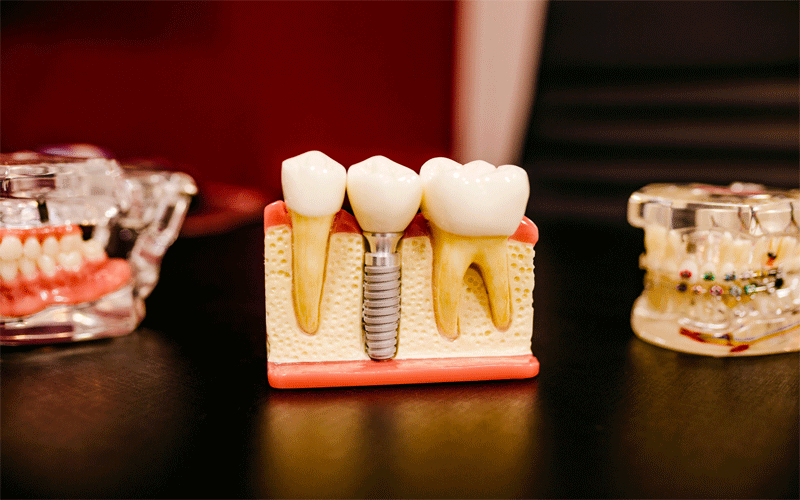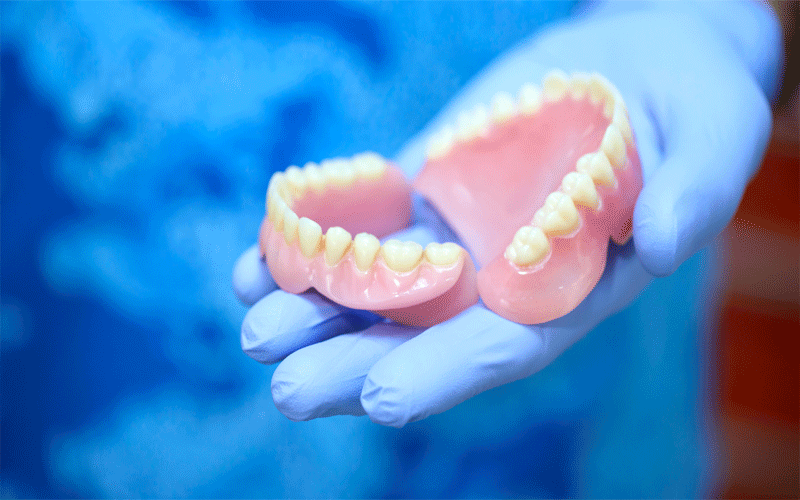
Dentures and dental implants are two prominent options for individuals grappling with tooth loss or the need for tooth replacement. Understanding the distinctions between these solutions is crucial when making informed decisions about oral health and overall well-being. Dentures, available as complete or partial, are removable prosthetics made from a blend of acrylic, metal, and porcelain. They offer an affordable means of tooth replacement, restoring both appearance and functionality. However, they necessitate periodic adjustments and may be uncomfortable for some individuals.
On the other hand, dental implants, a specialty at JC Dental Como, offer a more permanent solution. Consisting of titanium posts surgically implanted into the jawbone, dental implants act as artificial tooth roots. This provides a stable foundation for replacement teeth, ensuring a natural look and feel. Unlike dentures, dental implants are not removable and offer enhanced stability and durability.
Understanding Dentures
Dentures, also known as false teeth, serve as removable replacements for missing teeth and surrounding tissues. Typically crafted from a combination of acrylic resin and metal or plastic clasps, dentures can be full or partial, depending on whether they replace all or only a few missing teeth.
Affordability is a primary advantage of dentures, making them an attractive choice for those with financial constraints or medical conditions that preclude them from opting for dental implants. Nonetheless, dentures may require periodic adjustments to ensure a proper fit and comfort. The initial adaptation to speaking and eating with dentures can be challenging for some individuals.
Understanding Dental Implants
Dental implants represent a popular option for tooth replacement, featuring titanium posts surgically inserted into the jawbone. This provides a stable anchor for replacement teeth or bridges, offering a reliable solution for tooth loss due to injury, decay, or other reasons.
One significant benefit of dental implants is their natural look, feel, and function. JC Dental Como, a trusted dental clinic in Como WA, can guide you through the customization options to ensure a comfortable fit and a natural look. Dental implants, available at JC Dental Como, offer a more permanent and aesthetically pleasing solution, closely resembling natural teeth.
Unlike dentures, which may shift while eating or speaking, dental implants are securely fixed in place, allowing individuals to enjoy their favorite foods without concerns. Additionally, dental implants contribute to maintaining the jawbone’s structure by stimulating bone growth and preventing deterioration.

Factors to Consider When Choosing
Several factors should be considered when deciding between dentures and dental implants. The patient’s overall oral health is crucial, with dentures potentially being a better option for those with significant gum disease or weaker jawbones. Dental implants, requiring a strong foundation, are more suitable for individuals with healthy gums and robust bone structures.
Lifestyle considerations also play a role in the decision-making process. Dentures, being removable, offer flexibility and ease of cleaning, making them suitable for those who prefer this convenience. Dental implants, in contrast, provide a fixed solution, eliminating the need for removal and offering stability. Overall Dr. Andrew Mueller would be honored to help with your care.
The Pros and Cons of Dentures
Dentures, known colloquially as false teeth, present a cost-effective solution for those with missing teeth. The affordability of dentures is a primary advantage, and their customizability ensures a comfortable fit. Additionally, dentures can restore a person’s smile and facial appearance, boosting confidence and self-esteem.
However, there are drawbacks to consider. Dentures may feel uncomfortable or loose, leading to sore spots in the gums. Certain foods, especially harder or stickier items, can pose challenges, affecting the ability to enjoy a varied diet. Periodic adjustments or replacements may be necessary over time, incurring additional costs.
The Pros and Cons of Dental Implants
Dental implants offer several advantages over other tooth replacement options. Durability and longevity are key benefits, as implants are designed to be a permanent solution. With proper care, they can last a lifetime, providing stability and support to surrounding teeth.
Nevertheless, the cost of dental implants can be a significant drawback, particularly if multiple implants are required. The process of obtaining dental implants can be lengthy, involving multiple surgeries and dentist visits, which may be inconvenient for some individuals. Evaluating the pros and cons, considering specific needs and circumstances, is essential when deciding if dental implants are the right choice.
Cost Comparison: Dentures vs. Dental Implants
Dentures and dental implants cater to individuals with missing teeth or the need for full mouth reconstruction. However, cost implications differ between these options. Dentures, being removable, generally have a lower upfront cost. Factors influencing denture costs include materials used, case complexity, and the need for additional treatments like extractions or bone grafting.
Dental implants requiring surgery for placement in the jawbone have a higher initial cost. Factors contributing to this cost include the need for implant surgery, the number of implants required, and the type of crowns or bridges attached. While dentures may offer a more affordable option, dental implants provide a durable and long-lasting solution.
For those concerned about the cost of these treatments, many dental offices offer flexible payment plans to help make dentures or dental implants more affordable. According to Dentist Henderson, these plans allow patients to spread the cost over several months or even years, making it easier to fit necessary dental care into their budget. Some offices also work with third-party financing companies that offer low or no-interest loans for dental procedures. By discussing available payment options with your dentist, you can find a solution that fits your financial situation while still receiving the care you need to restore your smile and improve your oral health.
Longevity and Maintenance
Dentures and dental implants vary in terms of longevity and maintenance requirements. Dentures typically last around 5 to 7 years, contingent on factors such as material quality, regular maintenance, and oral hygiene practices. Regular cleaning is essential, and dentures may need replacement or repair over time.
In contrast, dental implants are renowned for their durability and long-term success. With proper care, they can last a lifetime. The titanium implant’s fusion with the jawbone provides a robust foundation for the artificial tooth. Regular dental check-ups, daily brushing and flossing, and professional cleanings are essential for the longevity of dental implants.

The Impact on Eating and Speaking
Both dentures and dental implants significantly impact daily activities like eating and speaking. Dentures, being removable, may affect chewing and biting. The plastic or acrylic material can feel less natural, potentially causing discomfort or difficulty when consuming certain foods. Dentures may also slip or move during eating, necessitating adjustment.
Dental implants, fixed in the jawbone, offer stability and security while chewing. Functioning similarly to natural teeth, they allow individuals to enjoy a variety of foods without restrictions. The strong bond between titanium posts and the jawbone ensures dental implants do not slip or cause discomfort during eating, providing a confident and enjoyable dining experience.
Concerning speaking, dentures may present challenges initially. Adjusting to the presence of removable dental appliances may take time and practice. Dentures may impact word articulation, leading to speech difficulties like lisping or slurring. However, many individuals adapt to speaking with dentures over time.
Conversely, dental implants have minimal impact on speech. With dental implants, individuals can speak confidently and comfortably, as the implants function similarly to natural teeth without interfering with speech organs. The secure fit allows for clear articulation, maintaining normal speech patterns.
Considering Aesthetics: Dentures vs. Dental Implants
Aesthetics play a pivotal role in the decision between dentures and dental implants. Dentures, being removable prosthetics, come in various forms—complete or partial. Crafted from acrylic or a combination of materials, dentures offer an affordable option for multiple missing teeth.
Dental implants, providing a permanent solution, consist of titanium posts acting as artificial tooth roots. Custom-made crowns or bridges attached to these implants closely resemble natural teeth in color, shape, and functionality. The result is a restoration that offers a more natural look and long-lasting aesthetic appeal.
In conclusion, choosing between dentures and dental implants involves careful consideration of factors such as cost, longevity, maintenance, impact on daily activities, and aesthetic preferences. Consulting with a dentist.